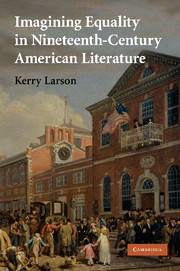2 - Inequality in theory
Published online by Cambridge University Press: 04 May 2010
Summary
A BENEVOLENT DESPOTISM
It may seem strange to say that inequality could not be theorized at a time when there was no lack of Southern ideologues attempting to do just that. The figure most often mentioned in this connection is George Fitzhugh, whose Cannibals All! (1857) is dedicated to the proposition that “domestic slavery is, in the general, a natural and necessary institution.” Sounding the usual themes of Tory conservatism, his book invokes Aristotle to confute Locke (CA, 71), bows before the Great Chain of Being (CA, 68), jeers at newfangled notions of human equality (CA, 87), and denounces the triumph of laissez-faire. In doing battle with this last enemy, the chief concern of the book, Fitzhugh draws freely on the discourse of socialism in pitting the “moral cannibalism” (CA, 16) of the Northern capitalist against the benign paternalism of the Southern slaveholder. On his account, the difference between those who are free and those who are enslaved comes down to a difference between two kinds of laborers – the workers of the North “who labor under all the disadvantages of slavery, and have none of the rights of slaves” (CA, 12) and the workers of the South who likewise labor under slavery but nevertheless do enjoy those rights. Sheltered from “the false, antagonistic, and competitive relations in which so-called liberty and equality place man” (CA, 36), the “negro slaves of the South are the happiest, and, in some sense, freest people in the world” (CA, 18).
- Type
- Chapter
- Information
- Publisher: Cambridge University PressPrint publication year: 2008

